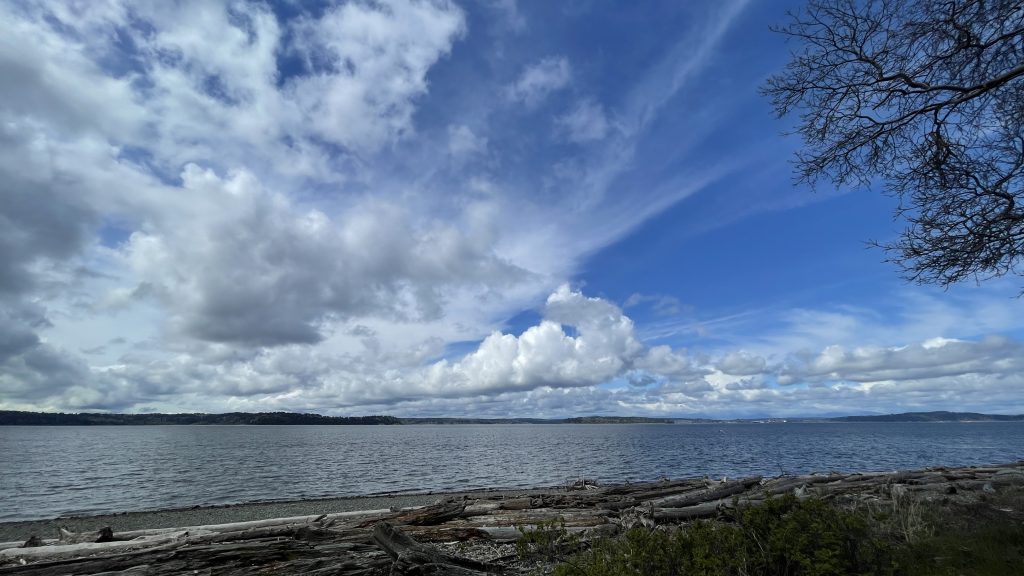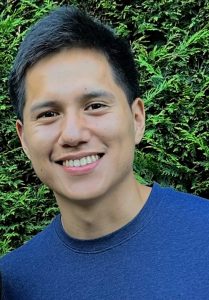Steven Nez of the Community-Oriented Public Health Practice MPH program looks to his past and the connection between Indigenous Youth and Water in his research into recognizing natural entities like water as integral elements of wellness.

Growing up on the Navajo Nation reservation in Arizona, Steven Nez always felt a connection with water. Now a student in the COPHP MPH program, Nez has channeled his heritage into his capstone project, which explores “how Indigenous Youth (Pacific Northwest American Indian Youth) conceptualize health and well-being through their connection to Water.”
Water is life
Nez explains, “[The Navajo Nation is an] inland tribe, but we have a clan system as well, which describes our ancestral lineage and how that connects to kinship. My first clan in Navajo, which is Diné, is Tábąąhá, which basically means Edge-Water. So my ancestors and previous communities were housed next to the edge of the water, and they prayed to the water, and that’s what I was told throughout my whole life, is that water has such a significance to me. I’ve grown up having respect for water and all that it does for us, because basically, water is life and you need it to survive. It’s in all living organisms. So that’s why I feel like it’s very important for research like this to be conducted.”
His mentor for the project is Dr. Eyob Mazengia, who specializes in the microbiology and epidemiology of food and waterborne pathogens, including in his work for Public Health Seattle and King County. Working in partnership with local nonprofit Seven Directions Indigenous Public Health Institute, Nez decided to focus specifically on Indigenous youth, in part to push back against ageism that downplays youth “brilliance.”
Currently, he’s analyzing qualitative data, including surveys and focus groups, that Seven Directions conducted in a pilot study with participants in the 2023 Canoe Journey, the first canoe journey after a four-year hiatus. Tribes from around Washington and British Columbia embark on a multi-day canoe journey ending on Alki Beach in West Seattle. As Nez describes, “There’s a lot of song and dance and celebration, laughter and community and connection to ancestors.”

Using insights from the surveys, Nez will create an infographic about water’s connection to holistic health for Seven Directions, and potentially other indigenous organizations, to disseminate within their community. As part of an iterative design process, Nez is also reaching out to Indigenous artists to design artwork, conducting a peer advisory group with Indigenous partners who participated in the pilot study, and speaking with the youth who participated in the pilot study to get their input.
Indigenous determinants of health
With this capstone, Nez seeks to expand and improve the social determinants of health framework. “Historically, health has been focused on physical and mental health and well-being, and separating both of those two things. You break your arm, you can get it repaired at a doctor’s office, and [then] you’re on your way, and you’re healthy,” he reflects.
“That’s what Western science really emphasizes, whereas the social determinants of health really encapsulate that holistic well-being is [also] how much money you make, access to education, access to quality healthcare. Things like that really affect the health and well-being of an individual or community. The Indigenous determinants of health is a relatively new concept that is starting to get more recognition in mainstream science that’s more tailored for Indigenous people and American Indians. So one of those determinants of health is water and land-based elements. My capstone is really providing research that supports the Indigenous determinants of health framework.”
Nez notes the connection between climate change and health observed in the qualitative data. For instance, declining salmon populations in Washington are threatening tribes’ ability to practice traditional fishing, impacting not only dietary health but also spiritual well-being. Several youth described how flooding and other environmental issues impact the health of water, which in turn affects their health. They describe water as an entity imbued with sacredness, almost a living thing.
With his capstone, Nez is pushing public health to recognize natural entities like water as integral elements of wellness. “Historically, there’s not a lot of metrics that include land-based elements, like water, or land, for example, or even spiritual connections to animals. Because since time immemorial, Indigenous people have really had mutual respect for those types of entities, and it’s been reciprocated through those types of elements that help with health and wellbeing,” Nez says.
“I know that from past experience, just my lived experience of being American Indian.”